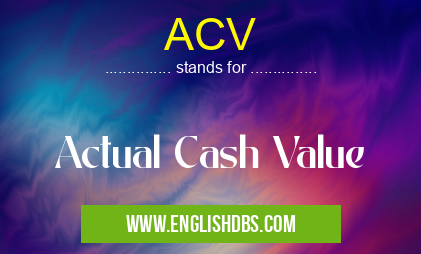What does ACV mean in ACCOUNTING
Actual Cash Value (ACV) is a term used in the insurance industry to define the value of an insured item. It is based on a combination of depreciation and replacement cost. ACV measures how much an asset or property is worth at its current market value, which could be different from its original purchase price. By knowing the ACV of something, it can help determine what the settlement amount should be when an event like damage or theft occurs.

ACV meaning in Accounting in Business
ACV mostly used in an acronym Accounting in Category Business that means Actual Cash Value
Shorthand: ACV,
Full Form: Actual Cash Value
For more information of "Actual Cash Value", see the section below.
» Business » Accounting
What is Actual Cash Value (ACV)?
Actual Cash Value, also referred to as ACV, is a measure of how much something is worth at the time it’s damaged or destroyed due to an insured event. It takes into consideration both current market value and depreciation in order to come up with a settlement figure for damaged items that are repairable or replaceable. For example, if your computer was worth $1,000 when you bought it 5 years ago but now has decreased in value due to wear and tear, its ACV would likely be much lower than $1,000 even though that was the original purchase price. ACV also applies to cars and other vehicles in cases of accidents where there is no total loss. In this scenario, a typical insurance claim might cover repairs up to the vehicle’s ACV rather than its original purchase price because ACV takes into account wear and tear and depreciation over time. In some cases, there may also be additional coverage such as gap insurance that can help pay for any difference between the amount paid out by an insurer and what still needs to be paid off on a car loan or lease agreement after a claim is settled. Gap coverage can bridge this gap between claim money and outstanding debt if applicable.
How Does Actual Cash Value Work?
Actual cash value works by taking into account both current market value and depreciation in order to come up with a settlement figure for items that are repairable or replaceable. It ensures fairness for both parties in instances where an insured event occurs resulting in damage or loss of property since it factors in both age and condition of an asset at the time of occurrence. The formula used takes into account depreciation based on use as well as age so that claimants don’t get paid more than they should simply because their item happens to be new or virtually unused at the time damages occurrred.
Final Words:
Actual Cash Value (ACV) is an important concept for those involved with insurances claims since it forms one part of deciding what amount should be covered by insurers when certain events occur leading to loss or damage of items covered under a given policy agreement. Knowing how ACV works can help ensure that claimants are fully aware of how much they should expect from settlements when filing claims with their insurer for damages incurred due to events like theft or vandalism covered by various policies.
ACV also stands for: |
|
| All stands for ACV |
